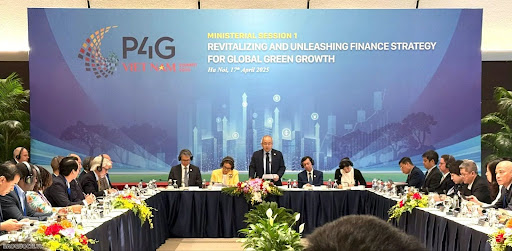Within the framework of the Global Green Growth Forum – P4G 2025, a series of high-level discussions brought together leaders from ministries, domestic and international experts to explore comprehensive solutions for promoting green growth. From sustainable finance strategies, breakthrough technological applications, and innovations in food and energy systems, to the development of human resources for the future economy – each session offered a focused perspective on global efforts to achieve net-zero emissions and sustainable development in the new era.
1. Parallel Ministerial Session 01: Revitalizing and Unleashing Finance Strategy for Global Green Growth
The first discussion session, titled “Redefining and Leveraging Financial Strategies to Promote Global Green Growth,” was chaired by Deputy Minister of Finance Đỗ Thành Trung. Mr. Trung shared key directions related to green finance and the role of national financial institutions.

Image credit: Nguyễn Linh – The World & Vietnam Report
The session focused on three main topics: experiences in developing green financial markets, legal–technical–market barriers, and policies to attract green investments from both the public and private sectors.
Deputy Minister Trung emphasized the positive signals from the rapid growth of green credit in Vietnam, with outstanding loans increasing nearly eightfold since 2015, reaching VND 564 trillion by 2023. He stressed that national financial institutions should take a pioneering role in building legal frameworks and developing green financial markets, while serving as a central actor in inter-sectoral and international coordination to support businesses and attract investment for green projects.
2. Parallel Ministerial Session 02: Riding with the Green Revolution 4.0: The Journey of Transforming the Food System for a Sustainable Era
Chaired by Vietnam’s Minister of Agriculture and Environment Đỗ Đức Duy, the second session of P4G 2025 focused on technological solutions and innovations for building climate-resilient, low-emission agricultural and food systems that can keep pace with population growth and sustainability demands.
Participants shared policy experiences in promoting technological innovatijon, improving resource efficiency, and highlighted the crucial roles of regulatory bodies and international organizations in facilitating technology transfer and strengthening farmer capacity.
The session also showcased successful green agricultural models from P4G member countries and international organizations and businesses, contributing to food security and the creation of a more sustainable and resilient food system for the future.
3. Parallel Ministerial Session 03: Game-changing Technology for Green Transition and Sustainable Development in the Intelligent Age
The ministerial-level session, chaired by Minister of Science and Technology Nguyễn Mạnh Hùng, brought together domestic and international representatives to explore the role of advanced technologies—particularly AI and digital transformation—in emission reduction and resource optimization.
Minister Hùng emphasized that technology is at the heart of Vietnam’s green transformation journey, reaffirming the nation’s commitment to achieving net-zero emissions by 2050. He underscored the need for a comprehensive ecosystem including technology, institutional frameworks, human resources, and data.
.png)
Representatives from countries such as Japan and various international organizations shared successful technological innovations supporting green transition efforts, including energy control AI, environmental sensors, and agricultural digitization. All participants agreed that international cooperation and technology sharing are key to a successful green transition.
4. Parallel Ministerial Session 04: Investing in People – Shaping the Workforce for the Future Economy
The 4th discussion session, chaired by Deputy Minister of Education and Training Nguyễn Văn Phúc, explored the role of education in the shift toward a green and sustainable economy.
Deputy Minister Phúc stressed that education is a core factor in developing professions related to the circular economy, enabling a workforce capable of adapting to and leading this transition. He emphasized that sustainable development is grounded in optimizing resources and minimizing environmental harm—goals that education can help achieve through fostering green sectors such as renewable energy, environmental technology, waste management, and organic agriculture.
.png)
The Ministry has introduced policies to support the development of these industries, while creating opportunities for new training programs. The Deputy Minister also highlighted the importance of aligning education with industry to connect theory with practice, making training programs more effective.
Minister Phúc further called for stronger international cooperation in green skills training and the implementation of new education models to facilitate job transitions, especially for workers impacted by the shift toward a green economy.
5. Parallel Ministerial Session 05: Innovative Solutions for the Effective and Sustainable Energy Transition
The fifth discussion session at the Global Green Growth Forum, chaired by Deputy Minister of Industry and Trade Nguyễn Thành Long, brought together representatives from multiple nations and international organizations.
Deputy Minister Long emphasized the global commitment to achieving an environmentally friendly, efficient, and sustainable energy transition. He noted that alongside government support, strong engagement from the private sector and international community is essential in developing renewable energy solutions, building supporting infrastructure, and offering preferential financing for green energy projects.
The session featured insights from leading countries in green energy transition—including Italy, Indonesia, and Sweden—who shared valuable lessons on promoting renewable energy, shifting to clean energy sources, and improving energy efficiency to protect the environment and foster sustainable development.
These discussions opened up numerous opportunities for international cooperation in renewable energy development and encouraged creative solutions to help countries achieve their green energy transition goals.